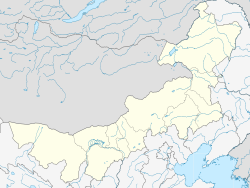Dolon Nor
Dolon Nor
多伦淖尔镇 | |
|---|---|
| Coordinates: 42°12′24″N 116°29′05″E / 42.20667°N 116.48472°E | |
| Country | China |
| Region | Inner Mongolia |
| League | Xilin Gol |
| County | Duolun County |
| Elevation | 1,237 m (4,058 ft) |
| Time zone | UTC+8 (China Standard) |
| Postal code | 027300 |
| Area code | 0479 |
Dolon Nor (simplified Chinese: 多伦淖尔; traditional Chinese: 多倫淖爾; pinyin: Duō lún Nào'ĕr; Template:Lang-mn, Doloon nuur, seven lakes; also: To-lun, Dolonnur), is a town and the county seat of Duolun County, Xilin Gol League in the Inner Mongolia Autonomous region, China. It is of historical importance because the remnants of Shangdu, the summer capital of Kublai Khan and the following Mongol emperors of the Yuan dynasty (13th and 14th century), are located some 28 kilometers (17 miles) northwest of the modern town. Beginning in the 17th century, the Manchu emperors of the Qing dynasty developed the city as a religious center.[1]
In the Encyclopædia Britannica Eleventh Edition (1911), the city is described as follows:
The town proper almost exclusively occupied by Chinese, is about a mile in length by half a mile in breadth, has narrow and dirty streets, and contains a population of about 26,000. Unlike the ordinary Chinese town of the same rank, it is not walled. A busy trade is carried on between the Chinese and the Mongolians, who bring in their cattle, sheep, camels, hides and wool to barter for tea, tobacco, cotton and silk. At some distance from the Chinese town lies the Mongolian quarter, with two groups of lama temples and villages occupied by about 2300 priests. Dr Williamson (Journeys in North China, 1870) described the chief temple as a huge oblong building with an interior not unlike a Gothic church. Lamamiao is the seat of a manufactory of bronze idols and other articles of ritual, which find their way to all parts of Mongolia and Tibet. The craftsmen work in their own houses.[2]
Another, longer description of the city is to be found in the remarkable writings of Évariste Huc (1813–1860), a Frenchman who stayed there in 1845 on his way to Lhasa (which he reached after 18 months of travelling).
In 1933, the town was the object of fighting between the Japanese and their Manchukuoan puppet troops and the Chahar People's Anti-Japanese Army.
See also
References
- ^ To-lun, The Encyclopædia Britannica Online, accessed 18 May 2007.
- ^ One or more of the preceding sentences incorporates text from a publication now in the public domain: Chisholm, Hugh, ed. (1911). "Lama-Miao". Encyclopædia Britannica. Vol. 16 (11th ed.). Cambridge University Press. p. 100.
Chisholm, Hugh, ed. (1911). "Lama-Miao". Encyclopædia Britannica (11th ed.). Cambridge University Press.

